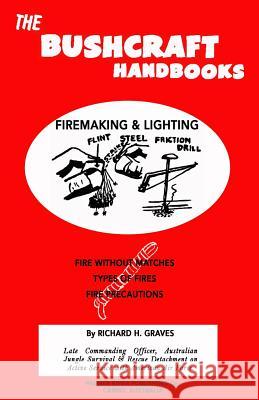The Bushcraft Handbooks - Firemaking & Lighting » książka
The Bushcraft Handbooks - Firemaking & Lighting
ISBN-13: 9781484842461 / Angielski / Miękka / 2013 / 42 str.
"The Bushcraft Handbooks" were first published in Australia in 1952. Based on the Author's wartime service in Australia and New Guinea teaching "Junglecraft" to Australian and American forces, they are distilled, concentrated old-time bushcraft knowledge, presented in a very easy to assimilate format. For those who remember them, the Bushcraft Handbooks are also a heavy hit of nostalgia. Rather than publish all of the volumes under the one cover, the Author originally chose to publish each aspect of bushcraft in its own individual handbook. His rationale was that the reader was more inclined to take a 50 page handbook with him into the wilds than a 400 page book. The former can be easily slipped into a pocket or daypack, while the latter cannot. The Bushcraft Handbooks are useless unless the reader practices the skills the books were designed to impart. The individual handbooks format was chosen to support that end. Out of print for decades, and in keeping with the Author's wishes, this series of Bushcraft Handbooks are reproduced as close to their original format as possible. The series comprises the following volumes: Bush Ropemaking, Bush Hutmaking, Traps & Snares, Bush Campcraft, Time & Direction, Travel & Gear, Food & Water in the Bush, Firemaking & Lighting, Trapping & Tracks, Knots & Lashings. From the introduction to "Firemaking & Lighting" "The ability to obtain fire is essential in the bush. Fire can provide warmth, comfort, and protection. It is essential for the preparation of food, because heat in one form or another chemically affects the cells of plant foods, making some yield their nourishment, and others release their toxic elements. Fire enables man to cook flesh and also to preserve it by smoking or drying. Fire is essential to make polluted water safe and drinkable. The ability to obtain fire under any conditions, provided that combustible material is available, is one of the first essentials in out-of-door living. The confidence which follows when one masters the skill of lighting fire with no equipment is remarkable. Making fire by friction and other means is not easy, but when the skill has been mastered, the person acquiring the skill acquires greater knowledge of himself and greater confidence in his ability to overcome obstacles, both valuable characteristics in all avenues of life. The ability to make fire under almost any condition is essential to the bushman."
Zawartość książki może nie spełniać oczekiwań – reklamacje nie obejmują treści, która mogła nie być redakcyjnie ani merytorycznie opracowana.











